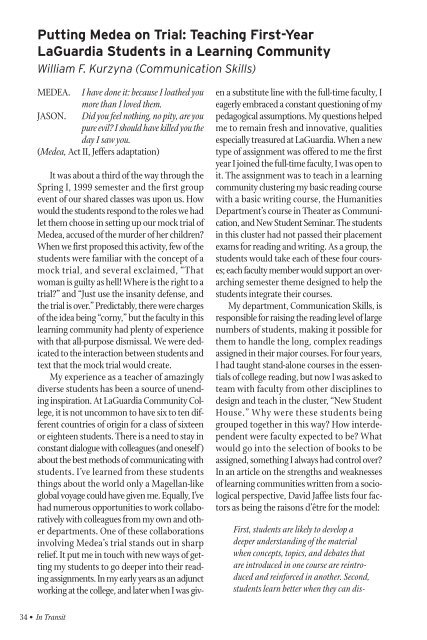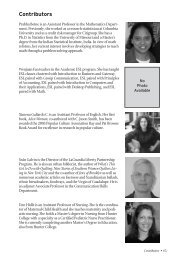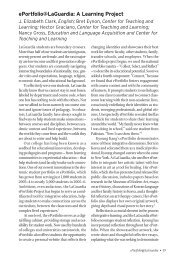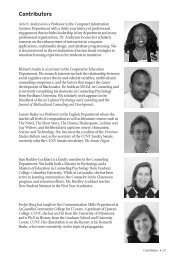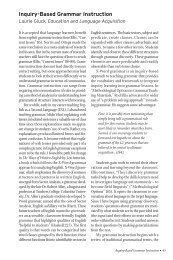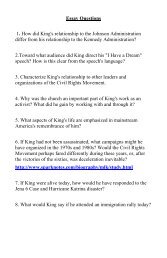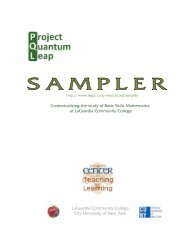Putting Medea on Trial - Center for Teaching and Learning
Putting Medea on Trial - Center for Teaching and Learning
Putting Medea on Trial - Center for Teaching and Learning
Create successful ePaper yourself
Turn your PDF publications into a flip-book with our unique Google optimized e-Paper software.
<str<strong>on</strong>g>Putting</str<strong>on</strong>g> <str<strong>on</strong>g>Medea</str<strong>on</strong>g> <strong>on</strong> <strong>Trial</strong>: <strong>Teaching</strong> First-Year<br />
LaGuardia Students in a <strong>Learning</strong> Community<br />
William F. Kurzyna (Communicati<strong>on</strong> Skills)<br />
MEDEA. I have d<strong>on</strong>e it: because I loathed you<br />
more than I loved them.<br />
JASON. Did you feel nothing, no pity, are you<br />
pure evil? I should have killed you the<br />
day I saw you.<br />
(<str<strong>on</strong>g>Medea</str<strong>on</strong>g>, Act II, Jeffers adaptati<strong>on</strong>)<br />
It was about a third of the way through the<br />
Spring I, 1999 semester <strong>and</strong> the first group<br />
event of our shared classes was up<strong>on</strong> us. How<br />
would the students resp<strong>on</strong>d to the roles we had<br />
let them choose in setting up our mock trial of<br />
<str<strong>on</strong>g>Medea</str<strong>on</strong>g>, accused of the murder of her children?<br />
When we first proposed this activity, few of the<br />
students were familiar with the c<strong>on</strong>cept of a<br />
mock trial, <strong>and</strong> several exclaimed, “That<br />
woman is guilty as hell! Where is the right to a<br />
trial?” <strong>and</strong> “Just use the insanity defense, <strong>and</strong><br />
the trial is over.” Predictably, there were charges<br />
of the idea being “corny,” but the faculty in this<br />
learning community had plenty of experience<br />
with that all-purpose dismissal. We were dedicated<br />
to the interacti<strong>on</strong> between students <strong>and</strong><br />
text that the mock trial would create.<br />
My experience as a teacher of amazingly<br />
diverse students has been a source of unending<br />
inspirati<strong>on</strong>. At LaGuardia Community College,<br />
it is not uncomm<strong>on</strong> to have six to ten different<br />
countries of origin <strong>for</strong> a class of sixteen<br />
or eighteen students. There is a need to stay in<br />
c<strong>on</strong>stant dialogue with colleagues (<strong>and</strong> <strong>on</strong>eself )<br />
about the best methods of communicating with<br />
students. I’ve learned from these students<br />
things about the world <strong>on</strong>ly a Magellan-like<br />
global voyage could have given me. Equally, I’ve<br />
had numerous opportunities to work collaboratively<br />
with colleagues from my own <strong>and</strong> other<br />
departments. One of these collaborati<strong>on</strong>s<br />
involving <str<strong>on</strong>g>Medea</str<strong>on</strong>g>’s trial st<strong>and</strong>s out in sharp<br />
relief. It put me in touch with new ways of getting<br />
my students to go deeper into their reading<br />
assignments. In my early years as an adjunct<br />
working at the college, <strong>and</strong> later when I was giv-<br />
34 • In Transit<br />
en a substitute line with the full-time faculty, I<br />
eagerly embraced a c<strong>on</strong>stant questi<strong>on</strong>ing of my<br />
pedagogical assumpti<strong>on</strong>s. My questi<strong>on</strong>s helped<br />
me to remain fresh <strong>and</strong> innovative, qualities<br />
especially treasured at LaGuardia. When a new<br />
type of assignment was offered to me the first<br />
year I joined the full-time faculty, I was open to<br />
it. The assignment was to teach in a learning<br />
community clustering my basic reading course<br />
with a basic writing course, the Humanities<br />
Department’s course in Theater as Communicati<strong>on</strong>,<br />
<strong>and</strong> New Student Seminar. The students<br />
in this cluster had not passed their placement<br />
exams <strong>for</strong> reading <strong>and</strong> writing. As a group, the<br />
students would take each of these four courses;<br />
each faculty member would support an overarching<br />
semester theme designed to help the<br />
students integrate their courses.<br />
My department, Communicati<strong>on</strong> Skills, is<br />
resp<strong>on</strong>sible <strong>for</strong> raising the reading level of large<br />
numbers of students, making it possible <strong>for</strong><br />
them to h<strong>and</strong>le the l<strong>on</strong>g, complex readings<br />
assigned in their major courses. For four years,<br />
I had taught st<strong>and</strong>-al<strong>on</strong>e courses in the essentials<br />
of college reading, but now I was asked to<br />
team with faculty from other disciplines to<br />
design <strong>and</strong> teach in the cluster, “New Student<br />
House.” Why were these students being<br />
grouped together in this way? How interdependent<br />
were faculty expected to be? What<br />
would go into the selecti<strong>on</strong> of books to be<br />
assigned, something I always had c<strong>on</strong>trol over?<br />
In an article <strong>on</strong> the strengths <strong>and</strong> weaknesses<br />
of learning communities written from a sociological<br />
perspective, David Jaffee lists four factors<br />
as being the rais<strong>on</strong>s d’être <strong>for</strong> the model:<br />
First, students are likely to develop a<br />
deeper underst<strong>and</strong>ing of the material<br />
when c<strong>on</strong>cepts, topics, <strong>and</strong> debates that<br />
are introduced in <strong>on</strong>e course are reintroduced<br />
<strong>and</strong> rein<strong>for</strong>ced in another. Sec<strong>on</strong>d,<br />
students learn better when they can dis-
cuss the subject matter of their courses<br />
with their peers. Third, students do better<br />
when they are actively engaged in<br />
their educati<strong>on</strong>, solving problems <strong>and</strong><br />
applying what they have learned.<br />
Fourth, students are more satisfied with<br />
their educati<strong>on</strong> <strong>and</strong> less likely to drop<br />
out when they get to know their professors<br />
outside the classroom. (Jaffee B16)<br />
Meeting with the faculty team be<strong>for</strong>e the start<br />
of classes, I got a sense of the potential offered<br />
by the cluster <strong>for</strong>mat. The faculty in this cluster<br />
were Gail Green-Anders<strong>on</strong> of English, who<br />
had d<strong>on</strong>e the li<strong>on</strong>’s share of assembling the joint<br />
syllabus; Lynne Alst<strong>on</strong>-Jacks<strong>on</strong> of Counseling,<br />
a learning-communities veteran who possesses<br />
an uncanny instinct <strong>for</strong> identifying the individual<br />
needs of her students; <strong>and</strong> Deborah Clint<strong>on</strong>,<br />
a Humanities instructor with valuable c<strong>on</strong>necti<strong>on</strong>s<br />
to off-Broadway theater. At every turn<br />
that semester, I was reminded of the deep, solid<br />
support available from our faculty team. The<br />
give <strong>and</strong> take around the table excited me. The<br />
theme we chose <strong>for</strong> the cluster, the c<strong>on</strong>structi<strong>on</strong><br />
of gender identity, fit well with the sort of<br />
challenges I like to present to my students to<br />
make their reading less mechanical <strong>and</strong> more<br />
vividly a part of their development of self. The<br />
texts we shared that semester, including Twelfth<br />
Night, M. Butterfly, as well as <str<strong>on</strong>g>Medea</str<strong>on</strong>g>, were all fascinating<br />
<strong>on</strong> their own. In combinati<strong>on</strong>, they<br />
allowed students to think more deeply about<br />
issues they c<strong>on</strong>sidered relevant to their lives. I<br />
left that first meeting with visi<strong>on</strong>s of a groundbreaking<br />
adventure.<br />
There was a risk, indeed, in c<strong>on</strong>fr<strong>on</strong>ting the<br />
issues that our syllabus set be<strong>for</strong>e the students.<br />
Coming to terms with gender identity, while a<br />
life-l<strong>on</strong>g process, has an intensity <strong>for</strong> college<br />
freshmen that can be overwhelming, <strong>and</strong> airing<br />
out these ideas in a large group of peers<br />
would be an experience needing the development<br />
of trust in the group. Would the students<br />
come to see the value of viewing their seemingly<br />
unshakeable sexual identities through the<br />
prisms of Euripides <strong>and</strong> Shakespeare? Students<br />
often tiptoe around such loaded themes. I<br />
admittedly shared some of their reticence in<br />
the early weeks, particularly as cracks began to<br />
show in the student group <strong>and</strong> cliques began<br />
to <strong>for</strong>m. Still, an adventure it was. This shared<br />
intellectual experiment would ultimately show<br />
that our students, who were c<strong>on</strong>sidered barely<br />
able to keep their heads above water in a college<br />
envir<strong>on</strong>ment, could creatively engage in<br />
far-ranging discussi<strong>on</strong>s. Students questi<strong>on</strong>ed<br />
how <str<strong>on</strong>g>Medea</str<strong>on</strong>g>’s female maternal nature could be<br />
rec<strong>on</strong>ciled with her acti<strong>on</strong>s in the play <strong>and</strong> what<br />
it meant to be able to appear in society as a<br />
member of the opposite sex, the aspect of<br />
Twelfth Night that aroused the most (uneasy)<br />
interest. In a paper presented at the meeting of<br />
the American Educati<strong>on</strong>al Research Associati<strong>on</strong>,<br />
several close observers of the learning<br />
community movement note that “...students<br />
experience <strong>and</strong> develop an appreciati<strong>on</strong> <strong>for</strong><br />
multiple perspectives; learn to use colleagues<br />
as resources; <strong>and</strong> are more willing to take <strong>on</strong><br />
the risk required to tackle complex, ill-structured<br />
problems...” (Wils<strong>on</strong>, Ludwig-Hardman,<br />
Thornam, <strong>and</strong> Dunlap).<br />
In additi<strong>on</strong> to our mock trial, we scheduled<br />
a per<strong>for</strong>mance of a scene from <str<strong>on</strong>g>Medea</str<strong>on</strong>g> by visiting<br />
actors from the Cocteau Repertory Company,<br />
who were also doing full-length renditi<strong>on</strong>s<br />
of the play in our college theater. For the trial<br />
of <str<strong>on</strong>g>Medea</str<strong>on</strong>g> – <strong>and</strong> the charmingly empty Jas<strong>on</strong> –<br />
we faculty decided to add to the sense of occasi<strong>on</strong><br />
<strong>and</strong> gravitas by making our first joint<br />
appearance be<strong>for</strong>e our students in costumes<br />
resembling those worn by traditi<strong>on</strong>al British<br />
barristers. My colleagues wore academic<br />
gowns; I wore the suit I reserve <strong>for</strong> weddings<br />
<strong>and</strong> funerals. The students were properly<br />
amused <strong>and</strong> impressed.<br />
As many roles as possible had been h<strong>and</strong>ed<br />
out to our New Student House cohort, <strong>and</strong><br />
the students, in my recollecti<strong>on</strong>, played them<br />
<strong>for</strong> all they were worth, particularly the prosecutors<br />
c<strong>on</strong>demning <str<strong>on</strong>g>Medea</str<strong>on</strong>g>. “These were her<br />
own children, underst<strong>and</strong>, <strong>and</strong> no matter how<br />
bad you get treated by your husb<strong>and</strong>, you d<strong>on</strong>’t<br />
kill them!” shouted <strong>on</strong>e of the prosecutors, <strong>and</strong><br />
those playing the courtroom audience gave<br />
their boisterous approval. The defense attor-<br />
<str<strong>on</strong>g>Putting</str<strong>on</strong>g> <str<strong>on</strong>g>Medea</str<strong>on</strong>g> <strong>on</strong> <strong>Trial</strong> • 35
neys <strong>for</strong> <str<strong>on</strong>g>Medea</str<strong>on</strong>g>, representing the views of many<br />
of the women students in the group, did a c<strong>on</strong>vincing<br />
job of laying most of the guilt <strong>on</strong> Jas<strong>on</strong>.<br />
They launched a powerful attack at Jas<strong>on</strong> <strong>for</strong><br />
his role in putting the tragedy into moti<strong>on</strong>. Our<br />
guidance of the proceedings from the judicial<br />
bench helped the participants shape complex,<br />
nuanced interpretati<strong>on</strong>s of good <strong>and</strong> evil, <strong>and</strong><br />
<str<strong>on</strong>g>Medea</str<strong>on</strong>g>’s place bey<strong>on</strong>d our normal underst<strong>and</strong>ing<br />
of these categories. This was rein<strong>for</strong>ced by<br />
follow-up discussi<strong>on</strong>s in class the next day. Having<br />
our mock trial to draw up<strong>on</strong>, students<br />
engaged in lively debate directly referring to<br />
Works Cited<br />
36 • In Transit<br />
the text of the play, just as the attorneys <strong>for</strong> each<br />
side had cited particular lines to make their<br />
arguments.<br />
The mock trial, growing out of faculty collaborati<strong>on</strong><br />
<strong>and</strong> the close relati<strong>on</strong>ships of the<br />
students in our cluster, was deeply satisfying<br />
<strong>and</strong> made possible a shared visi<strong>on</strong> of literature’s<br />
complexity <strong>and</strong> richness. My fervent advocacy<br />
<strong>for</strong> learning communities dates back directly<br />
to the potential I experienced as a judge at<br />
<str<strong>on</strong>g>Medea</str<strong>on</strong>g>’s trial, <strong>and</strong> my experiences since have<br />
<strong>on</strong>ly strengthened the verdict.<br />
Jaffee, David. “<strong>Learning</strong> Communities Can Be Cohesive <strong>and</strong> Divisive.” The Chr<strong>on</strong>icle of Higher Educati<strong>on</strong>,<br />
The Chr<strong>on</strong>icle Review 50:44 (2004).<br />
Jeffers, Robins<strong>on</strong>. <str<strong>on</strong>g>Medea</str<strong>on</strong>g>, freely adapted from the <str<strong>on</strong>g>Medea</str<strong>on</strong>g> of Euripides, New York: Samuel French, 1976.<br />
Wils<strong>on</strong>, Brent G., <strong>and</strong> Stacey Ludwig-Hardman, Christine L. Thornam, <strong>and</strong> Joanna C. Dunlap. “Bounded<br />
<strong>Learning</strong> Communities,” paper presented at the meeting of the American Educati<strong>on</strong>al<br />
Research Associati<strong>on</strong>, San Diego, CA, April 2004.


